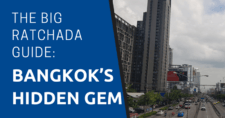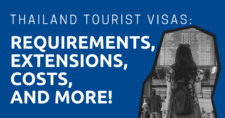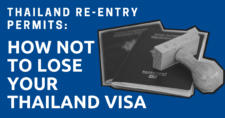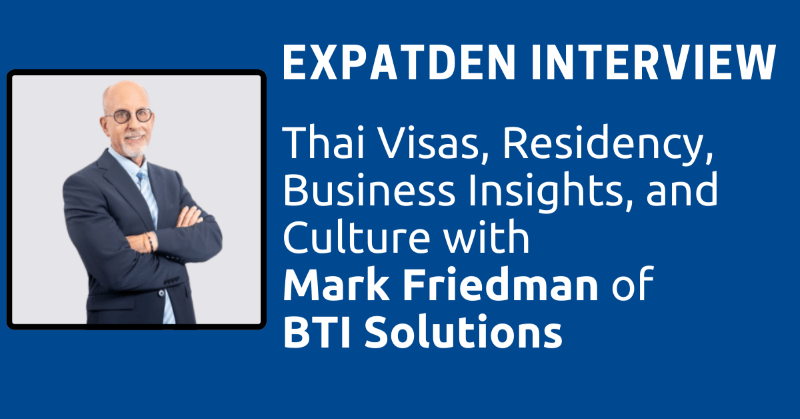
There was a time when I thought navigating Thailand’s visa system and business regulations was something every expat had to figure out on their own. After all, countless foreigners before me had managed to get their visas sorted and businesses registered, so how hard could it really be?
But over the years, I’ve watched too many expats struggle through the process, making costly mistakes and missing opportunities simply because they didn’t know what options were available to them. The visa landscape changes frequently, and what worked for someone five years ago might not be the best path today.
Recently, I had the chance to sit down with Mark Friedman, founder of BTI Solutions, who experienced this exact frustration when he moved to Thailand permanently in 2020. After retiring from his career as a general counsel in the U.S., Mark discovered there was no support system for expats navigating Thailand’s legal requirements. So he created one.
In this interview, I’ll walk you through Mark’s journey from frustrated expat to business owner, explore the various Thai visa options available to you, discuss pathways to permanent residency and citizenship, learn about starting a business in Thailand, and get insights into the cultural aspects of living and working in Thailand.
If you’d rather watch the interview than read the guide, check the full video out here:
Disclaimer: This transcript was automatically generated by AI and has been lightly reviewed and/or edited for accuracy. Errors in transcription may occur. The video recording above is the definitive source. Please refer to it for accurate quotes and context.
"*" indicates required fields
Disclaimer: This article may include links to products or services offered by ExpatDen's partners, which give us commissions when you click on them. Although this may influence how they appear in the text, we only recommend solutions that we would use in your situation. Read more in our Advertising Disclosure.
Contents
- Moving to Thailand as an Expat
- Starting a Business in Thailand Challenges
- Thai Business Culture and the Importance of Kreng Jai
- BTI Solutions Services for Expats
- Thailand Business Registration Requirements
- BOI Thailand Investment Requirements
- Thailand Visa Types and Options
- Thailand Immigration Office Experience
- Thailand Long-Term Visa Investment
- Thailand Permanent Residency Requirements
- Thailand Citizenship Requirements
- Choosing Thailand Visa Services
- Thailand Immigration Process
- Moving to Thailand Guide Book
- Final Thoughts on Living in Thailand
(And How It’s Costing Them)
Most expats throw money away, get lost in red tape, and miss the local hacks that make life easier and cheaper. ExpatDen Premium gives you the secrets seasoned expats use to save, earn, and thrive beyond the basics, saving you thousands and opening doors you didn’t even know existed.
Here’s what’s inside:
- Housing Hacks: Slash your rent by 40% or more - because the locals are laughing at what you’re paying.
- Banking Mastery: Stop wasting on fees and get top exchange rates. Why give your money away?
- Healthcare for Local Prices: Quality treatment without the expat price tag.
- Visa and Legal Shortcuts: No more bureaucratic nightmares. Get the visa and residency secrets that others pay their lawyer dearly for.
- Deep Discounts: Find the savings locals rely on for groceries, dining, and more.
If you’re serious about making Thailand work for you, join ExpatDen Premium and make Thailand work for you.
Moving to Thailand as an Expat
ExpatDen: Alright. So today I am joined with Mark Friedman, and he is from BTI Solutions, so we’ll get into exactly what you do for BTI Solutions, or what services you provide expats in Thailand, and potentially future expats that are looking to come to Thailand. But first, how did you wind up in Thailand? Can you give a little bit of backstory about, you know, what brought you here, how long you’ve been here for?
Mark: Yeah, so I’ve been traveling to Thailand for many, many years. I’ve been studying Buddhism for a lot of years, that’s what initially brought me to this part of the world, and then just the energy, the cuisine, cost of living, you know, all the things that attract people that, you know, you either step off the plane and you love it, or you don’t.

I eventually met my now-spouse, who resides at… we reside up in Pechabun Province, up in the up in the farm country in central Thailand. And we’ve been married for many, many years, and then in 2020, during that terrible COVID-1 15-day quarantine, we moved here. I left my last general counsel job in the States, and we settled into Thailand permanently.
ExpatDen: Okay, and originally you didn’t have a plan to start a business here, you were gonna come here and retire.
Mark: I was… I… yeah, the plan was to retire, and I… and I just suck at retirement. I was about a year here. And, you know, I just… I’ve been working hard for, you know, 4 or 5 decades, and felt like I was just kind of atrophying a bit. I also didn’t love my experience immigrating here. When my wife came to the States, there was software, there was all kinds of legal help, there was a roadmap, right?
When I came here, nobody put their arm around my shoulder and said, here are all your options, and this is the best way to do it, and get to know me, and kind of lay it out so I can make an informed decision. And so, at that point, I… I saw a need in the marketplace, and that’s why I started this firm.
Starting a Business in Thailand Challenges
ExpatDen: Yeah, that is definitely one of the challenges, is figuring out exactly what to do once you get here. Getting here is not the hard part, but every year, going through the visa process. things change so frequently, you know, you think you’re prepared one year after, like, 5 years of doing it, and you show up, and now things change, right? So… Yeah, there definitely is a need for this, type of business with the visas, because… there’s so many people that are confused.
You know, they come here, whether it’s on a retirement visa, or they want to come and study. they get married, like you, like you did, like I did myself. Got married and then came here, so… Yeah, what, what was the… what was starting this business like, before we get into, actually, the services you provide? Like, what, what… What challenges did you face when you were starting your business?
Mark: Many, many. So I was a general counsel, I was on executive teams in the U.S, practicing law there since 87, so I had lots of Western assumptions that I needed to shed. Particularly about legal training and legal licensing here, right? What’s it like to work with Thai attorneys? Thai staff in general, there’s this idea of Krangjai in Thailand, which is not putting pressure or embarrassing people, and really treating people gently and with patience and respect. Which you try to do anyway, but it’s… but it’s heightened here, right? Things like dealing with landlords.
You know, in the States, you would negotiate a lease, and you’d sort of be in partnership and get a tenant allowance for the build-out. None of that exists here. So, kind of everything from soup to nuts, to quote my dear departed mother, was different here. So there’s a pretty steep learning curve. There’s certainly opportunity here. I don’t mean to be negative about it at all. It’s just, as quickly as you can, shed your Western assumptions, talk to expats who have kind of blazed the path before you, and then my game changer was hiring Roy, who’s my managing counsel, time managing counsel.
And just in terms of what schools we hire from, and how we train people, he’s just been a godsend. So, listen to your Thai staff, and have them take the lead on a lot of these issues.
Thai Business Culture and the Importance of Kreng Jai
ExpatDen: Yeah, it’s funny that you brought that up, because when you talk to some expats here, you could kind of gauge how long they’ve been here. By what they’re talking about and how they’re talking about it, you know? If they still show a lot of frustration in the everyday… processes here, you could tell, okay, maybe they’re only here for about 2, 3 years. As you’re here for, like, 5, 6, 7 years, you start to adapt, like you said, to everything and the way it works here.
But bringing up the whole thing about Grangjai, I think that’s really interesting, because a lot of business owners they don’t talk about that part of running a business, the cultural part. You know, they talk about all the legal aspects and, you know, how to set everything up with the revenue department and lawyers and all that, but what has been the challenge for you as a Western business owner here in Thailand. Dealing with, the communication style, like you said. Is there any way that people can… Like, any practical advice that you give somebody? When, when working with Thai staff.
Mark: Sure, and by the way, you mentioned the technical side. The best thing I did day one was hire a really kick-ass Thai accountant to make sure my revenue filings, my VAT filings, my Social Security filings… day one, all of that was done, because I’ve had folks from the revenue department and guys with guns and badges show up, they look at our paperwork and they leave 5 minutes later, so… you know, we’re guests in this country, play it down the middle of the fairway.
But on the… On the staffing side, I think… Thai culture is very reflective. So if you’re putting out a positive energy, if you’re exhibiting patience and compassion, these Buddhist concepts, you get that back, and boy, does that feel great, right? We also recently had, a couple of weeks ago, an off-site to Hua Hin. And it was less this American experience of having an off-site with an American company, where we have, you know, slides and meetings and all of that. It was a family gathering. And, you know, it’s… there’s a level of community and commitment. that is really unique here. The flip side of that. Is if you express impatience or anger. you’re gonna get that back as well.
Either in people shutting down, or people just collapsing or leaving you. So, there is this… you know, often use too… maybe too well-worn phrase of mindfulness, but I think Thailand teaches successful people how to be more mindful, and how to interact productively and positively with staff, and then you’ll get fantastic results. But the… but the opposite isn’t true, and we Americans, you know this, right? We tend to be very direct. Not to be angry or to put people down, we just… let’s get it done. That directness needs to be tempered here.
ExpatDen: Yeah, yeah. I learned that very early on, I think in one of my early visa experiences. I had to go to Chang Huatana, to the immigration office, and I was dealing with some paperwork. And… the lady… I guess she interpreted my energy as a little bit impatient. You know, but for me, it was just a normal New Jersey way of doing things.
Mark: Right, right.
ExpatDen: she pulled my wife to the side, and she said, you know, your husband is very upset right now. Right. I had… I was laughing, because I’m like, I’m not really upset. Like, if you’ve seen a New Yorker upset, you would know what upset is, you know? Right, right.
Mark: Yeah, yeah. It’s like walking the streets in New York, and you power through versus, hey, let me be… Right? Sensitive to the other people around me. You couldn’t walk the streets of New York if you were sensitive to people around you. But you’re right, ties will pick up on that very quickly. I learned the lesson about honking my horn in a car. And the minute you do that, you’re gonna get a reaction, and you’ll end up going slower, or, you know, it never ends up positively, right? But I also love the fact that when you drive the streets of Bangkok. There’s not a lot of horn honking, there’s not a lot of that sort of interaction, so… So, another reason to love it here.
ExpatDen: Very taboo, very taboo thing to honk the horns.
Mark: Yeah.
ExpatDen: Yeah, my, my… the horn in my van doesn’t work right now. My daughter keeps telling me, Dad, you gonna get the horn fixed? And I said, you know what? I think it’s better not to have it, because if.
Mark: Right.
ExpatDen: I’m gonna want to use it, you know?
Mark: Right, flash the lights, don’t honk the horn. Yeah.
BTI Solutions Services for Expats
ExpatDen: Yeah. But, So, aside from the… alright, so you came here, you set up the BTI solutions because you found that need to help other expats. What kind of services do you actually offer? Is it just strictly visa services, or is it broader than that?
Mark: So the idea was to create, you know, the BTI is Bantai, which means Thai home, and so we have two aspects of our business. One is to help people create a Thai home here in Thailand, whether that’s visas, work permits. permanent residency, we even do a little bit of citizenship work, but also on the corporate side as well, to help people establish their business home here in Thailand. And then, as a member of the California Bar, I practice U.S. immigration law, and I have a U.S. visa team. We also have UK, Schengen, and Australian visa specialist, and so we help Thais create their Thai home overseas, whether that’s immigrating or… or visiting those countries.

ExpatDen: Okay. So, handling more so than just expats looking to come to Thailand, or expats currently in Thailand, it seems like you’re working with a lot more people than just what’s here inside Thailand.
Mark: Correct. And if you think about everything people need, for example, registering a marriage here, right? A lot of us come here, we have relationships, right? We have Thai families, and then helping, you know, Thai folks born overseas get their Thai citizenship here, or U.S. citizens, so on. So it’s… there’s a lot of services that touch on that. We even have, you know, a Thai licensed attorney who’s also a notary, so… We try to just make it as easy as possible.
Then if we don’t own… we don’t have the particular service in-house, we have trusted resources to help people settle in. For example. We work with a company named Seek to Insure, which is an insurance company. I’ve been working with Darren Sharp, who’s the founder there for many, many years. He’s really reliable, knows the market, right? And he can help people get the right health insurance policy here. So we try to expand that out to trusted resources as well.
ExpatDen: Right, okay, so yeah, it definitely sounds like… I can see why you call it Bantai, because it is a comprehensive… almost package of everything you need. Once, you know, everything you need to come here and just unlock the door and start living…
Mark: stone is, I wish I had. I wish I knew. I wish somebody told me, right? And if that’s the case, then we’ll… we feel like we’ve got the license to help offer that service.
Thailand Business Registration Requirements
ExpatDen: Right, and that’s exactly two points I want to bring up today and talk to you about, using myself as a case study, because there’s two things that I regret not doing when I came to Thailand. Number one was starting a business right away, which I still haven’t done, but that is one of my plans. I’ve been here for, like, 11 years.
And I feel like I fell behind in that, you know, and I’m… now I’m here, I’m comfortable, I missed the opportunity, but I’m wondering if there’s a way to actually do that now, so I want to pick your brain a little bit about the different methods of opening up a business. I know in the States, we could do, you know, an LLC, a corporation, but I’m not familiar with the way things work here in Thailand. And the other thing would be permanent residency, because I have Thai children.
I found out that I could have, worked towards building permanent residency here in Thailand. when I first got here, I should… that is something that I should have done, you know, and again, I let all these years pass. I feel like I almost missed that opportunity to do that, so… yeah, going back to the first point, which is the business, what would be some… some opportunities here for people to open up a business, as far as requirements, financial requirements, or partnerships with ties, anything like that that you could provide us with?
Mark: Sure, it’s different here, like so many things, in terms of the business structure. So, there are no partnerships. In fact, I had to inform BOI staff about what a partnership in a 1065 was, it just doesn’t exist here. Everything is kind of run through a Thai Limited company. And the basics are, it’s pretty easy to register a Thai Limited company, and fundamentally, you need a majority shareholder that is a Thai national.
Could be a spouse, could be Thai partners, some people… do that a little bit off the books with nominees, I wouldn’t suggest that. But, you know, down the middle of the fairway, 51 percentage Thai ownership, 49 percentage, right, expat ownership. pretty straightforward in terms of the registration of the business, and then VAT registra… VAT registration, and other kinds of things you need to do to be in compliance with tax and other strictures, okay?
However. For Americans, such as yourself, there’s a special treaty called the Treaty of Amity, which allows you, with a bit of additional ministerial effort and expense, to be a majority owner, to own your company here in Thailand, through this special treaty with the United States. There is also the Board of Investment, and I love this agency here in Thailand. They report directly to the Prime Minister. Their charter is very straightforward.
Drive economic growth and activity in Thailand, and they do that two ways. One is through sponsoring and having certain company promotions, and the other is through the LTR visa program. to attract successful or highly educated people to the kingdom. So on the business side, in order to get BOI certification, it’s like pitching a PE firm or an investment bank.
You have to have a business plan, you have to make an investment in that process, and an investment in the business. But once you get BOI certification. Then, in terms of ownership, staffing, and taxes, you’re in an advantaged position. So, that’s certainly something for someone serious that wants to open up a pretty substantial business here.
They should… they should explore BOI as a… as… as a possibility. Now, there are some businesses, like the legal profession, where that’s not… right, possible for them. So I have majority Thai ownership here, but for many businesses, particularly in areas that Thailand’s trying to drive, investment, such as tech, those opportunities abound.
BOI Thailand Investment Requirements
ExpatDen: And what’s… what are some of the financial requirements? Is it based on the category that you fit into for BOI, or is there one.
Mark: Yeah.
ExpatDen: requirement for all categories.
Mark: Yeah, so you’re looking at… and it really depends, right, on the category and what you’re trying to do here, but the capital investment isn’t that great. You know, a couple of million baht, right? And it really depends on whether you’re forming just a… the typical Thai limited company, or you’re going with BOI certification. The real expense comes in in building the business, but the required capital you know, from an American perspective, isn’t… isn’t outrageous.
So a couple of million baht, what? US$60,000, something like that. But you can start a business here for US$30,000. I would say, though, that you need some staying power here, and like any business anywhere, you should be sufficiently capitalized. To kind of get through the first couple of few years, until you really have the momentum and you’re moving forward.
ExpatDen: Okay. And so, would the US$30,000 be for the registered company, not part of BOI?
Mark: Registered capital, yeah. And that relates to your… your, your, you know, for each, business non-B visa, right? How much registered capital you need. And again, one of our… one of our offers is to do free consultations with business people. Royer Managing Thai Council.
I can’t practice Thai law, so everything today is just informational. But we have a great Thai legal staff here, and Roy leads our corporate team, and so he’d be happy to kind of run down those… the particulars for what a particular person wants to do.
ExpatDen: Right, so if somebody wanted to go through this BOI process with BTI Solutions, you would provide the whole package for them? Would you help with the business plan? Would you sit down and talk to them and ask them exactly what they’re trying to do? Everything would be included in this package.
Mark: That’s exactly correct. So, you establish the company, then you go into BOI, And then you follow up with BOI, as you know that a lot of things here are relational, right? So the BOI staffer or officer that’s assigned to your matter, right, to be in communication with them, to get feedback, if you need to change or add or amend anything to do that, and to assist the client with getting to the finish line, yes.
Thailand Visa Types and Options
ExpatDen: Okay. Alright. And now with the visas, you also offer services for every type of visa that’s available in Thailand, I would… I would assume.
Mark: Yeah, and to your earlier point, things change here, right? I was shocked to see the… what called a digital nomad, the DTV visa, right? We always had hard conversations. If you’re over the age of 50, pretty easy to come to Thailand. There’s lots of options. If you’re under the age of 50, it’s a lot tougher, right? If you’re not buying a privilege visa, which is certainly a way to get here, it’s a concierge service, but that can for some people, be outside of their budget.

Here’s a 5-year visa for remote workers or people who want to go to a Muay Thai academy or a cooking school for THB10,000, right? So that was a game changer. On the other side of the equation was the LTR visa, which is a BOI program for successful They call it wealthy pension, or I call it successful, older folks. And then there’s, you know, people that want to make a substantial investment here, US$500,000, buying a condo or two, or a villa.
There’s also the highly skilled professional category, and then if you’re working for a major company, like you’re an airline pilot, working for a publicly traded airline, you can come here. And the tax benefits are terrific, and the BOI really is put in a number of great incentives, including both the DTV and the LTR being family-friendly visas. But yes, there’s the typical non-retirement for those over 50, and then if you’ve got a Thai family.
The non-o-dependent, or non-o-marriage visa, and then, of course, just for an employee, let’s say you’re working for, you know, Agoda. There’s the standard non-B visa. And non, by the way, is non-immigrant. The only way to immigrate to Thailand is either permanent residency or citizenship, so these are all the non-immigrant categories. They’re just designations by the Ministry of Foreign Affairs. So yes, we handle all of those. What’s most important, though. is understanding… the person with whom we’re speaking.
So, how long do you want to be here? What are your aspirations? Maybe you don’t want to work today. Do you want a path? eventually to permanent residency, right? So, it’s time horizon activities, and then their pain point around administration stuff, right? I don’t want to go to John Watana every year, or I don’t mind it. Right? It’s budget. It’s… there’s so many things that fit into that, and there may be a short-term strategy. You can start out with Visa A, but eventually you’re going to be moving into Visa B, and then to… and then on to permanent residency at some point.
Thailand Immigration Office Experience
ExpatDen: just to be clear, I’ve never heard anybody say that they do enjoy going to Changwatana. If they have, they’re a special kind of expat.
Mark: Well, you know, the person that really values the fact that they’re spending THB1,900 on an extension, plus THB3,800 for the reentry permit, that’s, you know, they’re fine with that. I would also say, Zhang Want and I, you know, the hardworking staff at immigration, boy, I would not want that job. It’s a really tough job, right? Yeah. And, like any place where lots of people gather, it’s a pretty good food court down there, so if you do get stuck there for the day, at least you’ll have something good to eat. But yes, it is a day of your life, and as the older I get, the more… Time becomes precious, right?
ExpatDen: Yeah, exactly. But I think, you probably feel the same way. You gotta remind yourself that you’re doing this for this half a day or full day, because you get to enjoy the rest of the 364 days in Thailand. So, not a bad trade-off.
Mark: It’s a great trade-off, and I always try to keep in mind that, you know, cost of living here, the value proposition, it’s not just everything is less expensive, but the value proposition, for example, in the healthcare system is kind of off the charts. So. every country has its ministerial annoyances, and, you know, Thailand’s no exception, the US is no exception, the UK has its own, you know, things that you have to do. But at the end of the day, the value proposition here, and of course, the lovely people, make it all worthwhile.
Thailand Long-Term Visa Investment
ExpatDen: Yeah, for sure. Going back to the higher-end visas, I would say the long-term visas, or the, they have those, I’m not sure if it’s called, like, the Golden Visa or something, or maybe something equivalent to that. What would be something you would tell a concerned person that is maybe a little bit hesitant to invest that much money into the country?
So they want to come here for the 5 or 10 years on a long-term visa. They see what’s going on, they only see the bad stuff that’s happening in the news, obviously, because that’s what usually makes the headlines. What would you tell them to ease their concerns about investing in the country?
Mark: So, there’s lots of visas where you don’t have to make a substantial investment, and if you think my horizon may be a year or two, and you’re over the age of 50, start with a non-retirement visa. You know, you need to put about US$23,000 in a bank account, but it’s still your money, right? You’re parking it there. And give it a try.
If at the end of the day it’s not working for you, you can withdraw the funds and You know, go find someplace else to live. But then, if you find, hey, this is really where I want to live in the long term. you can keep extending your non-retirement indefinitely, or you could look at a 10-year LTR visa. There’s also 5, 10, and 15-year privilege visas.
So you can put your toe in the water with certain visa programs, even the DTV program. Which, for THB10,000, for 5 years, allows stays of up to 180 days at a time, right? So, you know, you want to spend 6 months here, pop out again, pop in. You’ve got those options. If you find economic opportunity here, then you can look at forming a company and a non-B visa.
If you find love here, right, and end up getting married, you look at the non-O marriage visa. So, as you deepen your roots here, your visa options, I think. Become, much broader, and you’ve got lots of different choices to make.
Thailand Permanent Residency Requirements
ExpatDen: Right, and that’s pretty much what I want to lead into next, is the whole thing going to permanent residency. Or citizenship, eventually. I’m not sure what the difference is between the two, but… For somebody like me that always planned to stay here for the rest of my life, I knew already that I was gonna move here and stay here. I felt like I should have been doing permanent residency when I got here.
I should have started a 3-year process. I should have been going through all those things now. I realized that I missed that opportunity, but I’m still here, I still want to be here for the long term, so… The question would be, what’s a… what… if somebody knows for sure they want to be here. should they go for permanent residency or citizenship? And if so, what should they do immediately when they get here on another type of visa to work towards that process?
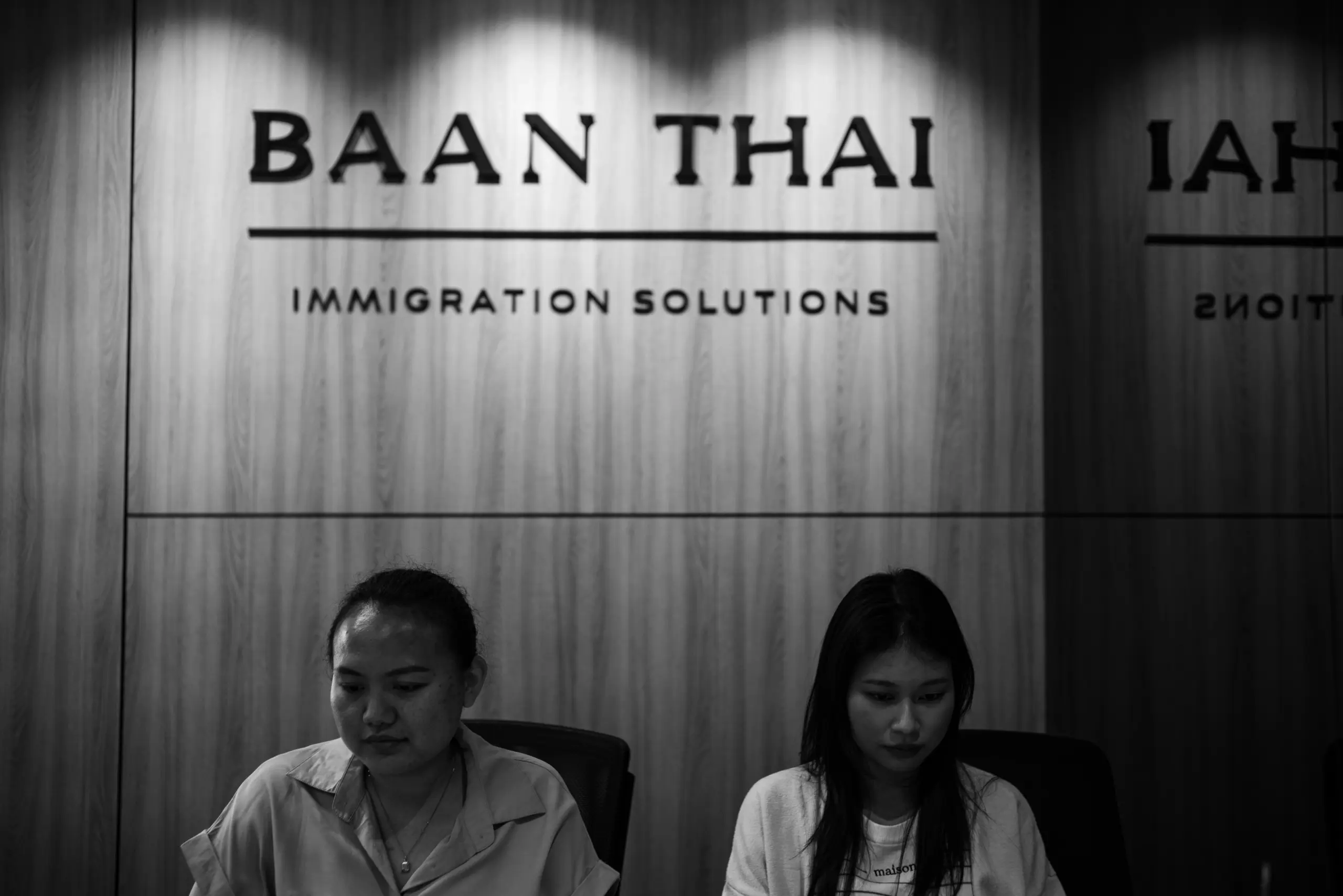
And for somebody like myself, who has been here for a long time already, and now, okay, they want to stay here for the rest of their lives, what should we be doing to Move towards that as well, the permanent residency or citizenship.
Mark: Yeah, well, first of all, let me say you’re still a young man, so you’ve got plenty of time. No regrets, right?
ExpatDen: It’s going quick.
Mark: There’s still time. Oh, yeah, tell me about it. But, and I do think you raise a great point, because as people… really settle in here, and they expand their social network, and they really feel like Thailand is home. But they’re on a visa, a year-to-year visa, a non-B visa. Like, a non-B visa, if you lose your job or decide to go do something else, you have 7 days. 7 days to come up with an alternative.
However, once you have permanent residency, you have a lot more freedom, and a lot more stability, and your foundation is solid. So, it’s different than permanent residency in the UK or US. In some ways it’s better, some ways it’s a little more challenging. But for anyone who is working in Thailand, for 3 years. and extending the same category of visa for 3 consecutive years, and earning THB80,000 to THB100,000 per month.
For the last 2 years, permanent residency is available to you. Now, if you’re also supporting a Thai family. the salary requirements come way down, and it could be your spouse, your Thai spouse, or you earning about THB30,000 a month, which is…
ExpatDen: a pretty low bar. Right.
Mark: But to your point, once you qualify, you ought to seriously consider it. I just had a gentleman come in, he has a wife who’s not Thai, and he decided to start his own business and leave his company, and now he’s struggling a little bit, and wished he would have gotten permanent residency, and brought her kind of under his status, before, right, a few years ago. So he had the optionality, right, to start his own business.
So it’s a little bit of a… I’ve also had folks come in And they’re a couple months away from retirement, and they’re about to surrender their non-B visa, it’s, like. a little too late, because you gotta… you gotta maintain that visa status. So, I would say after 3 years, or 4 years, and if it’s somebody like you that says, Thailand is home. look seriously at permanent residency.
So… so it’s the income requirement and holding your visa for 3 consecutive years. The other thing is, you need to speak Thai at a basic conversational level, a little more than taxi or restaurant Thai. We have a YouTube channel where I did an interview with Kruisa, who’s my Thai teacher, and she specializes in helping people prepare.
It’s not that big a deal, and if you spend 6 months, 8 months, a year getting ready, you’ll pass the Thai language interview. So that’s permanent residency. Now, you apply. And it will take about 6 to 8 months to finish that application process, including the initial application, and it’s a lot of information, including information from your company. then renewing that, or updating that information at the end of the tax year, and then going in for your Thai language interview.
And then it’s about another year and a half to wait to get your stamp. So it’s about a… a 2-3 year process, okay? But once you have it. you’re in, right? You’ve immigrated to Thailand. Now, for folks without a Thai spouse, Thai family, you hold permanent residency for 5 years, and then you can apply for citizenship. So what’s the difference here?
The difference is pretty substantial. With permanent residency, no more visas, you’re fine, you can be here regardless of your circumstance. With citizenship, you’re fully… a Thai national. You can own land, you don’t need a work permit anymore. You know, you’re here for as long as you love and want to be in Thailand, and, you know, have full rights and privileges.
But it takes a lot. It takes time. it takes a commitment to know the Thai language. It takes commitment to understand Thai civics and the royal family and so on. But for somebody like you, who’s been here for 12 years and will be here for another 30, it may be something that you need to think about. For people married. to a Thai spouse, you don’t necessarily have to go the PR route.
There is a kind of minimum income requirement of THB40,000 for a few years, but your language skills need to be… sharp, and you know, it’s that same kind of application process, although not through immigration. And I think at the end of the day, it’s… for somebody like you, it would be worth exploring.
Thailand Citizenship Requirements
ExpatDen: Right, yeah, that’s definitely the goal, so… From what I understand, I would probably apply based on kids, because I have two Thai children who are half Thai, half American children. So what would something like that consist of, the process of going through that?
Because you said the income would be lower. Would that have to be from a Thai source? Would that have to be from an overseas source, like, whether it’s overseas investments and I’m collecting interest, or for somebody that’s retired, collecting a pension, or does it have to come from a company that you’re working for within Thailand?
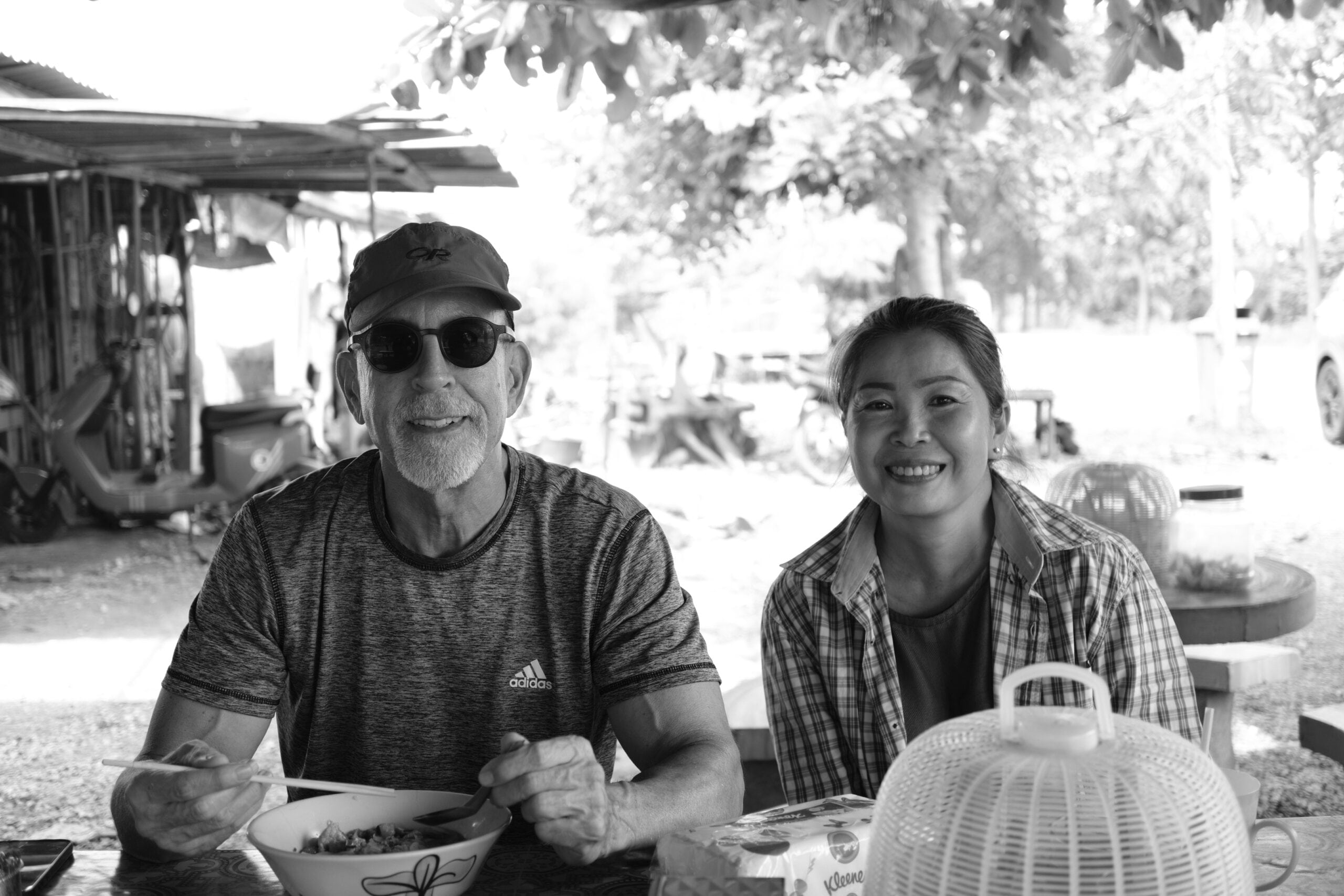
Mark: That’s a great question. So, when we talk about income, we’re talking about an economic contribution to the kingdom, which means we’re talking about Thai-sourced income on which you are paying taxes. Okay? Your foreign-sourced income, that’s great. Congratulations if you’ve got that.
And then there’s all kinds of tax issues about what you remit, and when, and what, you know, and then there’s double taxation agreements. There’s all kinds of… complexity around that, but in terms of either citizenship or PR, you’re really talking about Thai income.
ExpatDen: Okay. So you can’t collect a pension here, or some sort of investment money, and then… register for a tax ID in Thailand and just pay tax on that foreign income. That wouldn’t work that way.
Mark: doesn’t… doesn’t work that way. So, for citizenship and PR, you or your Thai spouse need to be… need to be working, in… in Thailand. And again, the bar is not very high, you know, at THB30,000 or THB40,000 under those circumstances. But you do need to be showing an economic contribution. It’s different than the U.S. The U.S, as a U.S. citizen, you’re entitled to bring your family to the United States. You need to show a certain amount of financial wherewithal. But it’s not that same sort of requirement.
ExpatDen: Okay, and so if the… if the, let’s say, for example, a Western husband is married to a Thai wife, she’s the only one working. he could also apply for a permanent residency based on her working for a Thai company.
Mark: Yeah, at THB30,000 per month over the past couple of years. Right. Which, again, is, what, about US$800-900 a month?
ExpatDen: I wonder if a lot of people know that, because it seems like that would open up the door for so many people to apply for permanent residency. And within the circle of expat friends that I have, I’ve never heard anybody even Even talk about this option, so… Yeah, I think this is why it’s important to reach out to companies like yours, because you have so many different options, you know exactly what’s available to all these different people. What would you say? Who’s your ideal client? If somebody is to come to you, like, who do you love working with the most to help come to Thailand?
Choosing Thailand Visa Services
Mark: So, I think people who think ahead, right? You know, we have people who come in, and they’re visa-exempt for 60 days, and suddenly they want to change their status, right? But there are things you can do before you come to Thailand. For example, if you’re over the age of 50, you’re interested in nano-retirement visa, the easiest thing to do is apply through your Royal Thai Consulate.
Let’s say you’re in New Jersey, right? Through the Royal Thai embassy in DC, Get your 90-day, come in, open your bank account, right? and then put in your requisite THB800,000, and go get your extension. Pretty easy peasy. So we like to… we like to work… we’ll work with anyone, right? And some people, you know, don’t plan ahead, and that’s okay. It just gets a little… it gets a little more difficult. And we just also like to work with people who, you know, basically… keep an open mind, are willing to share their aspirations, but I would say the most important thing is acceptance. come in and understand this is a different system, different way of doing things.
The people that succeed here have a Maipenry, a ligadai. Maipenrai is, like, you know, it’s okay, or a ligadai, whatever. And accept the fact that things at John Watana will work differently than, you know, at your local DMV in, you know, in Hackensack. It’s just a different place. But I think that’s the opportunity here, right? Is to learn a new culture and to kind of expand personally, grow personally through those differences. The people that say, my way or the highway, that can be, as you know, a little difficult here.
ExpatDen: Yeah, yeah. And what kind of questions should somebody ask when hiring a company? Like yours, because there’s a lot of… let’s say… I don’t want to mention anybody by names, but there’s a lot of companies out there that promise to get visas, but it’s not… the process isn’t, let’s say, legit.
You know, it’s not, it’s not… everything is not on the, on the books, you know, sometimes it’s a little bit under the table, so… to avoid getting involved in, in, in, let’s say, like, yeah, kind of visas that, might not be legal, or… anything like that? Like, how… what kind of questions should people ask a company to make sure that this is actually a legit company that they’re working with? To get their vehicle.
Mark: Yeah, that’s a great question, and look, again, we’re guests in this country, you and I, and, you know, there are rules, there are laws. And why, as you invest personally, socially, economically in a country, would you put… make yourself vulnerable? to coming in the back door and violating those laws and policies, right? Don’t do that.
I think the question to ask is, how do you work with your clients? And do you, right, pay to play, or do we go in the front door and we do everything, you know, in accordance with the law? I would also ask about the training of their staff. So, my staff We’re all Thai lawyers and legal counselors, right, with legal degrees. Or is it, you know, I had a different kind of training, and I’m an agent, and I’m gonna play off of my relationships?
I also think that as you ask about options, and sort of tell me, you know, help me strategize. If they can’t help you do that, right? If there’s somebody that says, what visa do you want? Yes, I can help. Just pay me a bunch of money, and give me your passport, right?
That’s one way to go. Again, you’re leaving yourself vulnerable here. Or, hey, here are your four options, here are the pluses and minuses, let’s help you make an informed decision, and then help you get your application in and get you to the finish line.
Thailand Immigration Process
ExpatDen: And could you put to rest any concerns that people might have about immigration themselves? So, as long as you show up with the proper documents. You can’t be denied your visa, would that be correct?
Mark: That’s correct. And so… part of this is… and you hear a hesitation in my voice, so a lot of eases are very straightforward. just know that for sometimes, staff or policy or unwritten practices change from time to time. So if you’re going in, talk to a friend who’s just been to Jangwatana, or one of the immigration offices, or talk to somebody like my TIDE legal team, but talk to somebody who’s kind of up-to-date on what’s happening.
You should also know that, that, that staff has discretion in the way in which they interpret and implement the law. And again, it’s that patience thing. So, if you think, hey, I’ve got my stuff together, and I have a complete, right, application package, and they say, yeah, but, you know, your photograph, I remember this, I didn’t have a collared shirt when I went, right? You smile? Why? And you go get a picture with a collared shirt, right? Because the only person that can grant you what you want, which is that visa stamp, is the person on the other side of the counter, right?
So, the answer is, know your stuff, come in organized. Understand also that the person on the other side of the counter is going to see 50, 60, 70 people speaking various languages, with various accents, and various degrees of understanding of what’s required. If you come in. You’re dressed right, you show respect, and you’re organized. That’ll go a long way in making this a very smooth encounter.
ExpatDen: Yeah, I could… yeah, I agree with that. I’ve faced all those issues and more with the pictures, and… You’re not allowed to have selfies, your arm can’t be in, you know, in the… both your hands have to be showing, and…
Mark: White background, right? All those little, little things, yeah, yeah.
ExpatDen: Yeah, it’s but it makes it all… it makes it all very interesting, you know? I always joke around that, you know, the month before going to immigration takes about a year off my life, but… The rest of the year here kind of adds, because of all the… the joy that I have of living here, so it’s definitely worth it in the end. But you…
Mark: Well, you know this, too. After you’ve done it for a while, it does get easier, right? You do get into a rhythm, you know what to expect, right? It does get easier over time.
ExpatDen: Yeah. And when they do throw you for the little loopholes, it doesn’t affect you as much as it used to. The first couple years, you always feel like, okay, I have to… they’re gonna kick me out of the country. Now it’s more like, okay, you missed this, you could email us, you don’t have to come back, email us and we’ll take care of it for you.
So, yeah, it does get easier. But you recently wrote a book about not only moving to Thailand, but you also added some of your own story to the book. It’s almost like part memoir, part practical how-to, and then you’ve got some input from other people who’ve been here for a while to get their perspective. So, what prompted you to write the book? Like, what was behind that, the idea?
Moving to Thailand Guide Book
Mark: Same reason I started the company. Boy, you know, why didn’t anybody explain this to me? Like, how to build a house, cultural differences, how to start a business, various locales that are available to me, all those kinds of things. And you’re right, I did have 5 other expats who have really succeeded here, willing to share their wisdom, what brought them here, what lessons they learned, what surprised them, and that sort of thing. And so, I tried to make it personal, right? Because I made lots of mistakes here. I had some real like, brain fart moments, where, like, how could I have done that?
And just helping people peek around those corners. So, I’ve been working on the book for the last year. We’re about to launch it in a couple of weeks on Amazon. We have a pre-launch special pricing that we’ll offer for a while, just to get people into it. And it’s really for anyone who’s contemplating moving here, or for somebody who’s been here But wants to deepen their experience and deepen their roots here. I’ll give you two examples real quickly. One is family, right?
When you marry a Thai spouse, you’re marrying into the Thai family, and family here means something different than it does in the West, so that’s something to think about, some conversations you want to have with your spouse and your Thai family. Also, land has a different value here. You know, in New Jersey, everybody sells their house when they retire, they move down to Florida, and land is a commodity.
Here, there’s an intrinsic value, and it’s about status, and who you are in the community, and so on. And there’s just certain things here that are different, and so I wrote the book to hopefully help people peek around those corners, and have an enjoyable read as you’ll laugh at some of the mistakes I made.
ExpatDen: Right, right. That’s how we learn, through the mistakes, right? And sharing those.
Mark: Oh, yeah.
ExpatDen: others.
Mark: Yep. Yes, indeed. Yes, indeed.
Final Thoughts on Living in Thailand
ExpatDen: Alright, so, Yeah, I do appreciate the time and the information. I’m sure this is, gonna be valuable for all the viewers. Is there anything else you want to leave? Anybody who’s watching, or who might be reading the story version of this? About BTI Solutions, about yourself?
Mark: Well, just coming to Thailand, right? This is a Buddhist country, and there is a Thai meditation about, you know, if you’ve been born over eons of lifetime, everybody at some point was your mother. And your mother sacrificed a lot for you, and if you could treat everybody here with the kind of compassion that your mother treated you, you’ll get along great here. What you put out there, you’re gonna get back.
Even if you try to speak the language, what I love here, oh, Putai Gang, you speak so, right? You just get so much warmth back here, and, you know, some of us, we get lost, kind of, in the details, we’re running a business. just keep that perspective, that this is a country full of compassion and wonderful people, and I think it’s a great place to consider retirement, or living, or in your case, starting a business.



